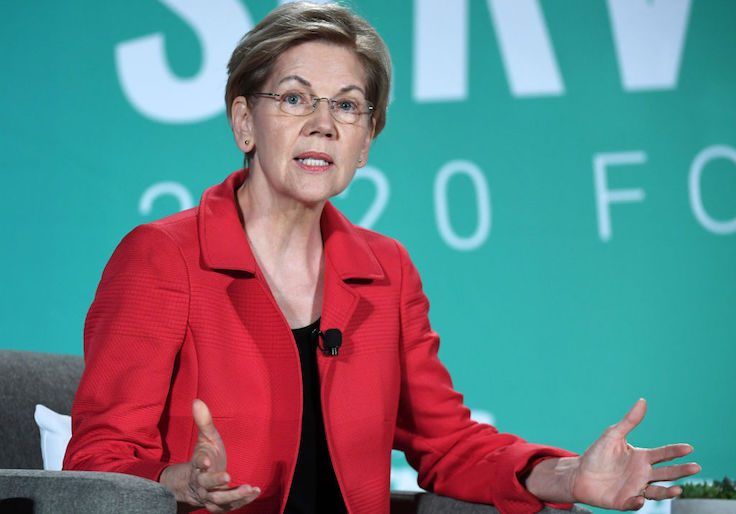The 74th anniversary of the United States' nuclear attack on Japan came and went without comment from Sen. Elizabeth Warren (D., Mass.), who last week said during the Democratic primary debate that America must give up its ability to strike first with a nuclear weapon to "make the world safer."
Warren made headlines with her debate stage pronouncement that the United States would only resort to using nuclear weapons if someone else used one first. "The United States is not going to use nuclear weapons preemptively, and we need to say so to the entire world," Warren said. "We will respond if someone else does, but not first."
But Tuesday on Hiroshima Day, a day traditionally used by like-minded opponents of the current nuclear posture such as Ploughshares Fund and Union of Concerned Scientists, Warren made no statement. Inquiries to her campaign on whether she would have used the atomic bomb in World War II or if she thought its use was a mistake went unanswered.
Warren's silence comes as her position on nuclear weapon faces criticism from both the political left and right.
Sen. Tim Kaine (D., Va.), the Democratic Party's vice presidential candidate in 2016, said letting the world know the United States is unwilling to strike first "actually may perversely encourage bad behavior in others."
Sen. Richard Blumenthal (D., Conn.), who like Kaine sits on the Senate Armed Services Committee alongside Warren, said her "no first strike" plan was "over-simplistic."
"Our nuclear force has to be an effective and strong deterrent, and so I think that it has to be regarded and used in that way, and over-simplistic terminology tends to diminish its force," Blumenthal said. "The problem with talking about first strike and the reason why it's over-simplistic is that we're developing new means of delivering nuclear deterrent, and I think that the meaning of first strike is undergoing new definitions."
Leading the criticism of Warren from the Republican Party has been Rep. Liz Cheney (R., Wyo.), who took to Twitter to ask Warren, "Which American cities and how many American citizens are you willing to sacrifice with your policy of forcing the U.S. to absorb a nuclear attack before we can strike back?"
Warren argued during the debate that expanding the ways nuclear weapons can be deployed "puts us all at risk."
"Our first responsibility is to keep ourselves safe, and what's happening right now with Donald Trump as they keep expanding the different ways that we have nuclear weapons, the different ways that they can be used, puts us all at risk," she said.
The decision to drop the bomb on Hiroshima in 1945 by then-president Harry Truman was made in hopes that it would allow the United States to avoid a costly invasion of Japan.
"It would have been hard to justify to the American public why [Truman] prolonged the war when this weapon was available," Harvard professor Chales Maier explained to CNN for its piece on Hiroshima Day. "It seemed to offer a potentially magical solution that would spare a lot of pain."
Maier also explained how ruthless Japanese tactics such as the Kamikaze attack made the idea of a prolonged war hard to swallow for military leaders.
"Suicide attacks are fairly common today, [but] at the time, the Japanese use of suicidal Kamikaze attacks had made a strong psychological impact on U.S. military decision-makers who reckoned that the whole country would be mobilized to defend the home islands," Maier explained. "The U.S. military was unwilling to say it could win the war without the bomb."
Former president Barack Obama considered but ultimately decided against adopting a "no first strike" policy. Leading foreign policy experts say the risks of the United States adopting the policy and diminishing the deterrent effects of its nuclear arsenal far outweigh the benefits.
